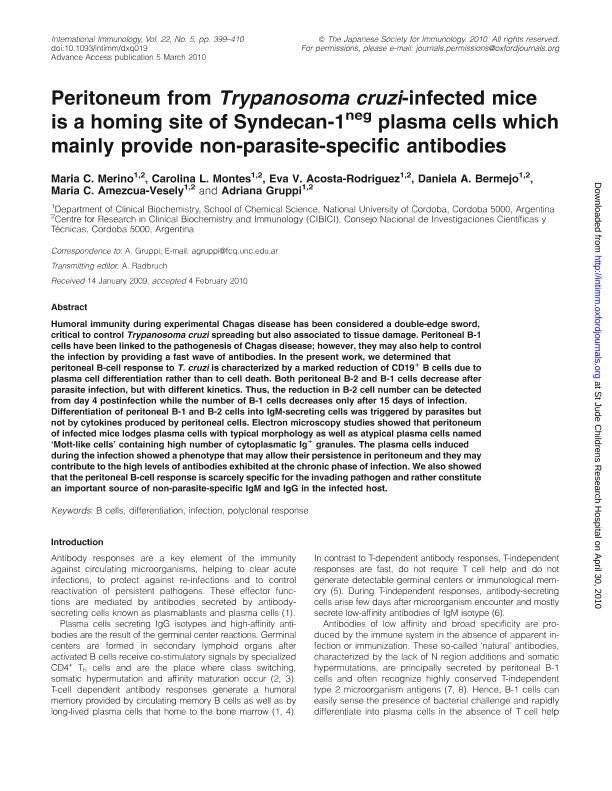Mostrar el registro sencillo del ítem
dc.contributor.author
Merino, Maria Cecilia

dc.contributor.author
Montes, Carolina Lucia

dc.contributor.author
Acosta Rodriguez, Eva Virginia

dc.contributor.author
Bermejo, Daniela Andrea

dc.contributor.author
Amezcua Vesely, Maria Carolina

dc.contributor.author
Gruppi, Adriana

dc.date.available
2021-04-23T20:22:48Z
dc.date.issued
2010-03
dc.identifier.citation
Merino, Maria Cecilia; Montes, Carolina Lucia; Acosta Rodriguez, Eva Virginia; Bermejo, Daniela Andrea; Amezcua Vesely, Maria Carolina; et al.; Peritoneum from Trypanosoma cruzi-infected mice is a homing site of Syndecan-1negplasma cells which mainly provide non-parasite-specific antibodies; Oxford University Press; International Immunology; 22; 5; 3-2010; 399-410
dc.identifier.issn
0953-8178
dc.identifier.uri
http://hdl.handle.net/11336/130804
dc.description.abstract
Humoral immunity during experimental Chagas disease has been considered a double-edge sword, critical to control Trypanosoma cruzi spreading but also associated to tissue damage. Peritoneal B-1 cells have been linked to the pathogenesis of Chagas disease; however, they may also help to control the infection by providing a fast wave of antibodies. In the present work, we determined that peritoneal B-cell response to T. cruzi is characterized by a marked reduction of CD19+B cells due to plasma cell differentiation rather than to cell death. Both peritoneal B-2 and B-1 cells decrease after parasite infection, but with different kinetics. Thus, the reduction in B-2 cell number can be detected from day 4 postinfection while the number of B-1 cells decreases only after 15 days of infection. Differentiation of peritoneal B-1 and B-2 cells into IgM-secreting cells was triggered by parasites but not by cytokines produced by peritoneal cells. Electron microscopy studies showed that peritoneum of infected mice lodges plasma cells with typical morphology as well as atypical plasma cells named 'Mott-like cells' containing high number of cytoplasmatic Ig+granules. The plasma cells induced during the infection showed a phenotype that may allow their persistence in peritoneum and they may contribute to the high levels of antibodies exhibited at the chronic phase of infection. We also showed that the peritoneal B-cell response is scarcely specific for the invading pathogen and rather constitute an important source of non-parasite-specific IgM and IgG in the infected host. © The Japanese Society for Immunology. 2010.
dc.format
application/pdf
dc.language.iso
eng
dc.publisher
Oxford University Press

dc.rights
info:eu-repo/semantics/openAccess
dc.rights.uri
https://creativecommons.org/licenses/by-nc-sa/2.5/ar/
dc.subject
B CELLS
dc.subject
DIFFERENTIATION
dc.subject
INFECTION
dc.subject
POLYCLONAL RESPONSE
dc.subject.classification
Inmunología

dc.subject.classification
Medicina Básica

dc.subject.classification
CIENCIAS MÉDICAS Y DE LA SALUD

dc.title
Peritoneum from Trypanosoma cruzi-infected mice is a homing site of Syndecan-1negplasma cells which mainly provide non-parasite-specific antibodies
dc.type
info:eu-repo/semantics/article
dc.type
info:ar-repo/semantics/artículo
dc.type
info:eu-repo/semantics/publishedVersion
dc.date.updated
2021-04-09T16:21:42Z
dc.identifier.eissn
1460-2377
dc.journal.volume
22
dc.journal.number
5
dc.journal.pagination
399-410
dc.journal.pais
Reino Unido

dc.journal.ciudad
Oxford
dc.description.fil
Fil: Merino, Maria Cecilia. Instituto Nacional de Tecnología Agropecuaria. Centro de Investigaciones Agropecuarias. Unidad de Fitopatología y Modelización Agrícola - Consejo Nacional de Investigaciones Científicas y Técnicas. Centro Científico Tecnológico Conicet - Córdoba. Unidad de Fitopatología y Modelización Agrícola; Argentina
dc.description.fil
Fil: Montes, Carolina Lucia. Consejo Nacional de Investigaciones Científicas y Técnicas. Centro Científico Tecnológico Córdoba. Centro de Investigaciones en Bioquímica Clínica e Inmunología; Argentina
dc.description.fil
Fil: Acosta Rodriguez, Eva Virginia. Consejo Nacional de Investigaciones Científicas y Técnicas. Centro Científico Tecnológico Córdoba. Centro de Investigaciones en Bioquímica Clínica e Inmunología; Argentina
dc.description.fil
Fil: Bermejo, Daniela Andrea. Consejo Nacional de Investigaciones Científicas y Técnicas. Centro Científico Tecnológico Córdoba. Centro de Investigaciones en Bioquímica Clínica e Inmunología; Argentina
dc.description.fil
Fil: Amezcua Vesely, Maria Carolina. Consejo Nacional de Investigaciones Científicas y Técnicas. Centro Científico Tecnológico Córdoba. Centro de Investigaciones en Bioquímica Clínica e Inmunología; Argentina
dc.description.fil
Fil: Gruppi, Adriana. Consejo Nacional de Investigaciones Científicas y Técnicas. Centro Científico Tecnológico Córdoba. Centro de Investigaciones en Bioquímica Clínica e Inmunología; Argentina
dc.journal.title
International Immunology

dc.relation.alternativeid
info:eu-repo/semantics/altIdentifier/doi/http://dx.doi.org/10.1093/intimm/dxq019
dc.relation.alternativeid
info:eu-repo/semantics/altIdentifier/url/https://pubmed.ncbi.nlm.nih.gov/20207717/
Archivos asociados
